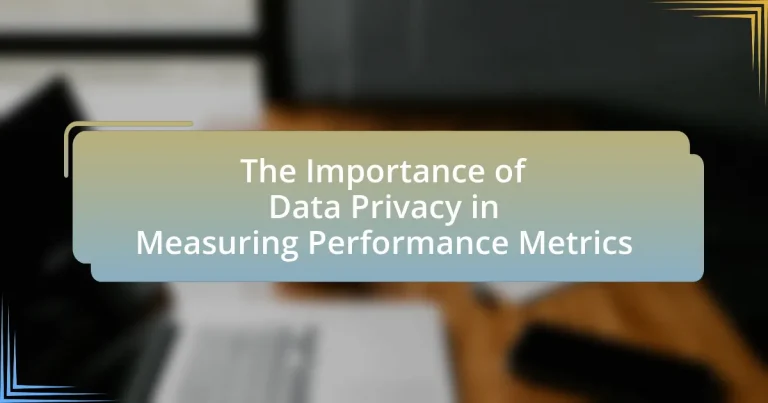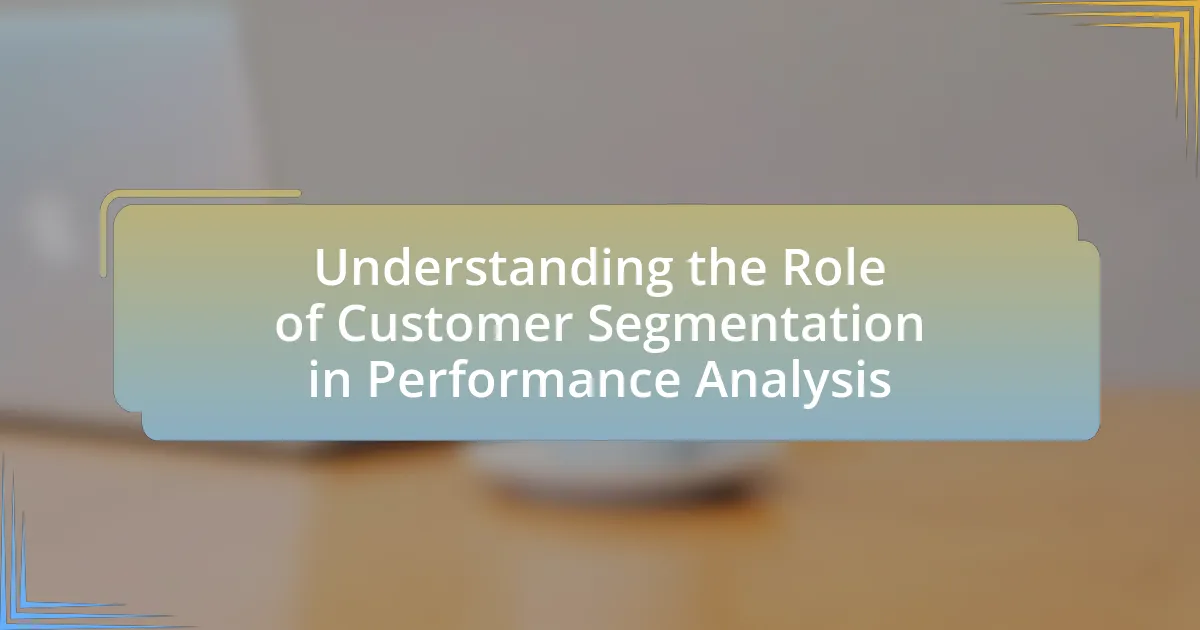Data privacy is a critical aspect of measuring performance metrics, as it protects sensitive information and fosters trust among stakeholders. The article explores the significance of data privacy in performance measurement, highlighting the risks of neglecting it, such as data breaches and loss of consumer trust. It discusses key principles of data privacy, including consent and data minimization, and examines how privacy regulations like GDPR and CCPA shape performance metrics. Additionally, the article outlines best practices for ensuring data privacy, the role of encryption and access control, and the challenges organizations face in maintaining compliance while effectively measuring performance.
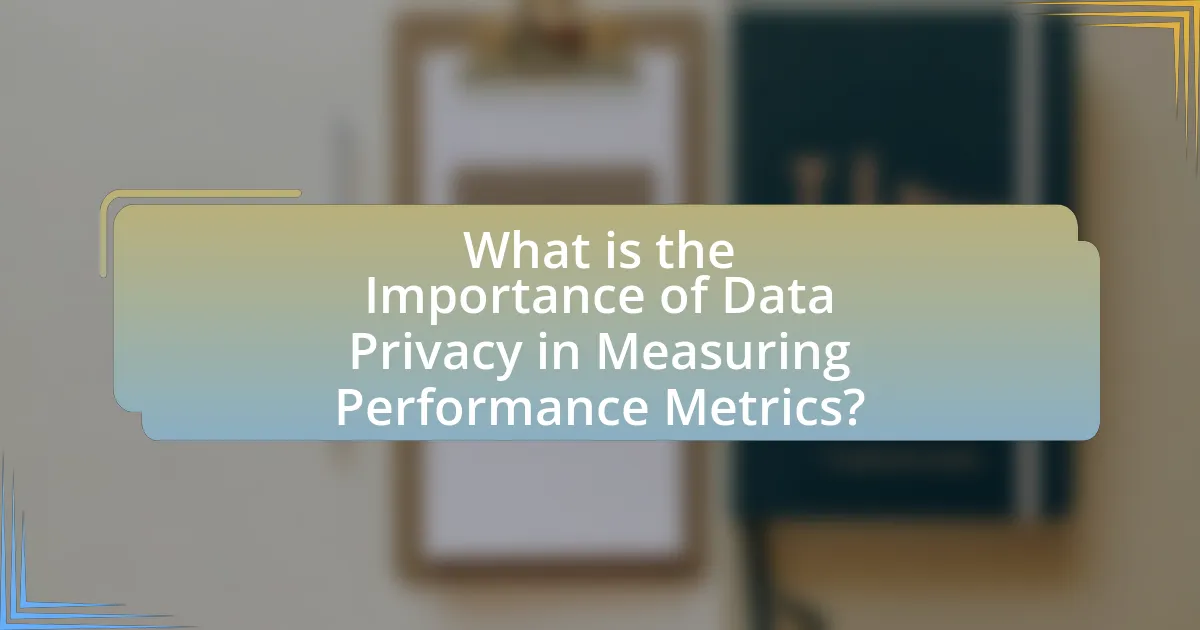
What is the Importance of Data Privacy in Measuring Performance Metrics?
Data privacy is crucial in measuring performance metrics because it ensures the protection of sensitive information while maintaining the integrity of data analysis. When organizations prioritize data privacy, they build trust with stakeholders, which is essential for accurate data collection and reporting. For instance, according to a 2020 survey by the International Association of Privacy Professionals, 79% of consumers expressed concern about how their data is used, indicating that privacy considerations directly impact user engagement and data quality. By safeguarding personal data, organizations can comply with regulations like GDPR and CCPA, which not only mitigate legal risks but also enhance the reliability of performance metrics derived from user data.
Why is data privacy critical in performance measurement?
Data privacy is critical in performance measurement because it safeguards sensitive information, ensuring compliance with regulations and maintaining user trust. When organizations measure performance, they often handle personal data, which, if mishandled, can lead to breaches and legal repercussions. For instance, the General Data Protection Regulation (GDPR) mandates strict guidelines on data usage, and non-compliance can result in fines up to 4% of annual global turnover. Protecting data privacy not only mitigates these risks but also fosters a culture of accountability and transparency, essential for effective performance evaluation.
What are the potential risks of neglecting data privacy?
Neglecting data privacy can lead to significant risks, including data breaches, identity theft, and loss of consumer trust. Data breaches expose sensitive information, which can result in financial losses for individuals and organizations; for instance, the 2020 Verizon Data Breach Investigations Report indicated that 86% of breaches were financially motivated. Identity theft can occur when personal data is accessed unlawfully, leading to unauthorized transactions and long-term financial damage for victims. Furthermore, organizations that fail to protect data privacy may experience a decline in consumer trust, as evidenced by a 2021 survey by PwC, which found that 79% of consumers are concerned about how companies use their data. This erosion of trust can ultimately impact a company’s reputation and bottom line.
How does data privacy impact stakeholder trust?
Data privacy significantly impacts stakeholder trust by influencing perceptions of security and ethical handling of personal information. When organizations prioritize data privacy, stakeholders feel more secure in their interactions, leading to increased trust. For instance, a 2020 survey by the International Association of Privacy Professionals found that 70% of consumers are more likely to engage with companies that demonstrate strong data protection practices. This correlation indicates that effective data privacy measures not only protect sensitive information but also enhance stakeholder confidence and loyalty.
What are the key principles of data privacy?
The key principles of data privacy include consent, purpose limitation, data minimization, accuracy, storage limitation, integrity and confidentiality, and accountability. Consent requires that individuals provide explicit permission for their data to be collected and processed. Purpose limitation mandates that data should only be used for the specific purposes stated at the time of collection. Data minimization emphasizes collecting only the data necessary for the intended purpose. Accuracy ensures that personal data is kept up to date and correct. Storage limitation dictates that data should not be retained longer than necessary. Integrity and confidentiality focus on protecting data against unauthorized access and breaches. Finally, accountability holds organizations responsible for complying with these principles and demonstrates transparency in their data handling practices. These principles are foundational to frameworks like the General Data Protection Regulation (GDPR), which aims to protect individuals’ privacy rights in the digital age.
What is the role of consent in data privacy?
Consent is fundamental in data privacy as it empowers individuals to control how their personal information is collected, used, and shared. This principle is enshrined in various data protection regulations, such as the General Data Protection Regulation (GDPR), which mandates that organizations must obtain explicit consent from users before processing their data. The requirement for consent ensures that individuals are informed about their data rights and can make choices regarding their privacy, thereby fostering trust between users and organizations.
How does data minimization contribute to privacy protection?
Data minimization contributes to privacy protection by limiting the collection and retention of personal information, thereby reducing the risk of unauthorized access and misuse. By only gathering data that is necessary for specific purposes, organizations can decrease the potential exposure of sensitive information. For instance, the General Data Protection Regulation (GDPR) emphasizes data minimization as a core principle, mandating that organizations collect only the data essential for their operations. This regulatory framework supports the notion that minimizing data collection directly correlates with enhanced privacy safeguards, as it lessens the volume of data that could be compromised in a breach.
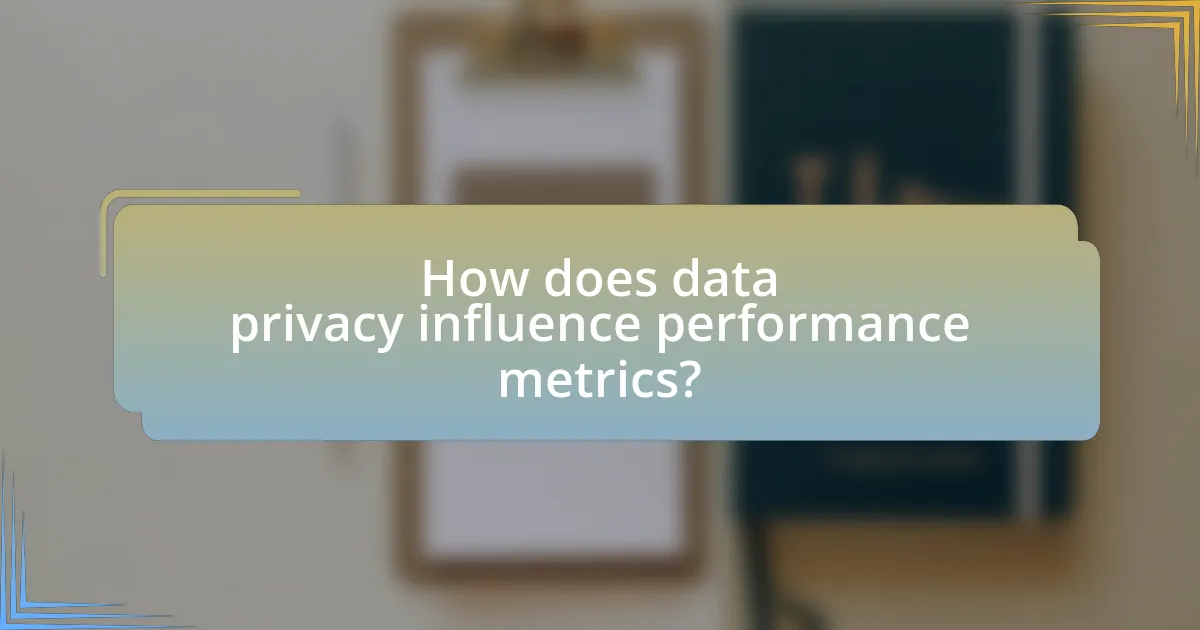
How does data privacy influence performance metrics?
Data privacy significantly influences performance metrics by affecting data collection methods and the quality of insights derived from that data. When organizations prioritize data privacy, they often implement stricter data governance policies, which can limit the volume and granularity of data available for analysis. For instance, regulations like the General Data Protection Regulation (GDPR) restrict the use of personal data without explicit consent, leading to potential gaps in data sets that can skew performance metrics. Research indicates that companies adhering to data privacy standards may experience a 20% reduction in available data points for analysis, which directly impacts the accuracy and reliability of performance metrics. Thus, while data privacy is essential for compliance and consumer trust, it can also pose challenges in achieving comprehensive performance evaluations.
What metrics are affected by data privacy considerations?
Metrics affected by data privacy considerations include customer engagement rates, conversion rates, and data accuracy. These metrics are influenced because data privacy regulations, such as GDPR and CCPA, restrict how organizations can collect, store, and utilize personal data. For instance, compliance with these regulations may lead to reduced data availability, which can directly impact customer engagement and conversion rates. Additionally, the need for anonymization or pseudonymization of data can compromise data accuracy, as it may limit the granularity of insights derived from the data.
How do privacy regulations shape performance metrics?
Privacy regulations shape performance metrics by imposing restrictions on data collection and usage, which directly influences how organizations measure success. For instance, regulations like the General Data Protection Regulation (GDPR) limit the types of personal data that can be collected and mandate transparency in data processing. This leads organizations to adopt alternative metrics that rely less on personal data, such as aggregate performance indicators or anonymized data analysis. Consequently, businesses must innovate their measurement strategies to comply with these regulations while still achieving their performance objectives, as evidenced by a study from the International Association of Privacy Professionals, which found that 70% of companies adjusted their performance metrics in response to GDPR compliance requirements.
What is the relationship between data accuracy and privacy?
Data accuracy and privacy are interrelated, as accurate data collection often requires careful handling of personal information to ensure compliance with privacy regulations. When data is collected and processed accurately, it enhances the reliability of insights derived from that data, which is crucial for performance metrics. However, maintaining privacy can limit the extent to which data can be accurately collected, as privacy laws, such as the General Data Protection Regulation (GDPR), impose restrictions on data usage and sharing. For instance, GDPR mandates that personal data must be processed lawfully, fairly, and transparently, which can complicate efforts to gather comprehensive data sets necessary for accurate analysis. Thus, while data accuracy is essential for effective performance measurement, it must be balanced with stringent privacy considerations to protect individuals’ rights.
How can organizations balance data privacy and performance measurement?
Organizations can balance data privacy and performance measurement by implementing robust data governance frameworks that prioritize user consent and anonymization techniques. These frameworks ensure that performance metrics are derived from aggregated data, minimizing the risk of exposing personally identifiable information. For instance, the General Data Protection Regulation (GDPR) mandates that organizations obtain explicit consent from individuals before processing their data, which encourages transparency and trust while allowing for effective performance analysis. Additionally, employing data encryption and access controls can further protect sensitive information, enabling organizations to measure performance without compromising privacy.
What strategies can be implemented to ensure compliance?
To ensure compliance with data privacy regulations, organizations can implement strategies such as conducting regular audits, providing employee training, and establishing clear data governance policies. Regular audits help identify compliance gaps and ensure adherence to regulations like GDPR or CCPA, which mandate specific data handling practices. Employee training programs raise awareness about data privacy requirements and promote a culture of compliance, reducing the risk of breaches. Clear data governance policies outline roles, responsibilities, and procedures for data management, ensuring that all employees understand their obligations. These strategies collectively enhance compliance and protect sensitive data, as evidenced by studies showing that organizations with robust compliance frameworks experience fewer data breaches and regulatory penalties.
How can organizations educate employees about data privacy?
Organizations can educate employees about data privacy through comprehensive training programs that cover relevant laws, policies, and best practices. These programs should include interactive workshops, online courses, and regular updates on data privacy regulations such as the General Data Protection Regulation (GDPR) and the California Consumer Privacy Act (CCPA). Research indicates that organizations with structured training see a 70% increase in employee awareness of data privacy issues, leading to better compliance and reduced risk of data breaches. Regular assessments and simulations can further reinforce learning and ensure that employees understand their responsibilities in protecting sensitive information.
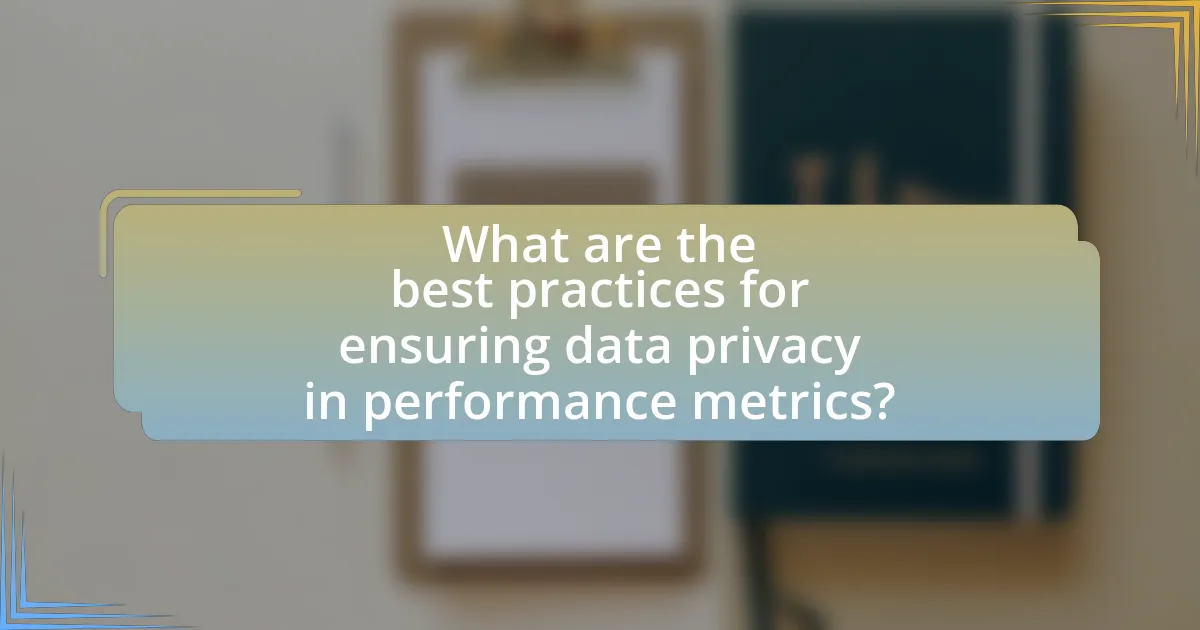
What are the best practices for ensuring data privacy in performance metrics?
The best practices for ensuring data privacy in performance metrics include implementing data anonymization, utilizing encryption, and establishing strict access controls. Data anonymization removes personally identifiable information, making it impossible to trace metrics back to individuals, which is crucial for compliance with regulations like GDPR. Encryption protects data during transmission and storage, ensuring that unauthorized parties cannot access sensitive information. Strict access controls limit data access to authorized personnel only, reducing the risk of data breaches. These practices collectively enhance data privacy and safeguard against potential misuse of performance metrics.
What tools and technologies can enhance data privacy?
Encryption tools, such as AES (Advanced Encryption Standard) and RSA (Rivest-Shamir-Adleman), enhance data privacy by converting data into a secure format that can only be accessed with a decryption key. These encryption methods are widely used in various applications, including secure communications and data storage, to protect sensitive information from unauthorized access. According to the National Institute of Standards and Technology (NIST), AES is a standard for encrypting sensitive but unclassified information, demonstrating its effectiveness in safeguarding data privacy. Additionally, privacy-focused technologies like Virtual Private Networks (VPNs) and secure web browsers (e.g., Tor) further enhance data privacy by masking users’ IP addresses and encrypting internet traffic, making it difficult for third parties to track online activities.
How can encryption protect sensitive performance data?
Encryption protects sensitive performance data by converting it into a format that is unreadable without a decryption key. This process ensures that even if unauthorized individuals access the data, they cannot interpret it, thereby maintaining confidentiality. For instance, the Advanced Encryption Standard (AES) is widely used to secure sensitive information, as it provides a high level of security through complex algorithms. According to a report by the National Institute of Standards and Technology (NIST), encryption significantly reduces the risk of data breaches, as encrypted data remains secure even if intercepted. Thus, encryption serves as a critical safeguard for sensitive performance data, ensuring its integrity and privacy.
What role does access control play in data privacy?
Access control is essential for data privacy as it regulates who can access sensitive information, thereby preventing unauthorized use and potential data breaches. By implementing strict access control measures, organizations can ensure that only authorized personnel have the ability to view or manipulate personal data, which is critical for maintaining confidentiality and compliance with regulations such as GDPR and HIPAA. Studies have shown that organizations with robust access control policies experience significantly fewer data breaches, highlighting the effectiveness of these measures in protecting data privacy.
What common challenges do organizations face regarding data privacy?
Organizations commonly face challenges such as regulatory compliance, data breaches, and employee training regarding data privacy. Regulatory compliance is complex due to varying laws like GDPR and CCPA, which require organizations to implement stringent data protection measures. Data breaches pose significant risks, with a report from IBM indicating that the average cost of a data breach in 2023 is $4.45 million, highlighting the financial impact of inadequate data security. Additionally, employee training is often insufficient, leading to unintentional data mishandling; a study by the Ponemon Institute found that 60% of data breaches are caused by human error. These challenges collectively hinder organizations’ ability to maintain robust data privacy practices.
How can organizations overcome resistance to data privacy measures?
Organizations can overcome resistance to data privacy measures by fostering a culture of transparency and education regarding data practices. By clearly communicating the benefits of data privacy, such as enhanced customer trust and compliance with regulations, organizations can alleviate concerns. Research indicates that 70% of consumers are more likely to engage with companies that prioritize data privacy, highlighting the importance of building trust. Additionally, involving employees in the development of data privacy policies can increase buy-in and reduce resistance, as they feel their input is valued.
What are the implications of data breaches on performance metrics?
Data breaches significantly undermine performance metrics by eroding trust, increasing operational costs, and disrupting service delivery. When a data breach occurs, organizations often experience a decline in customer confidence, leading to reduced engagement and sales, which directly impacts performance metrics such as revenue growth and customer retention rates. Additionally, the financial repercussions of a breach, including legal fees, regulatory fines, and costs associated with remediation efforts, can inflate operational expenses, further skewing performance metrics like profit margins. A study by IBM found that the average cost of a data breach in 2023 was $4.45 million, illustrating the substantial financial impact on organizations. Furthermore, data breaches can lead to service interruptions, affecting key performance indicators related to service availability and response times. Thus, the implications of data breaches on performance metrics are profound, affecting both financial and operational aspects of organizations.
What practical steps can organizations take to improve data privacy?
Organizations can improve data privacy by implementing robust data encryption methods. Encryption protects sensitive information by converting it into a secure format that can only be accessed by authorized users. According to a report by the Ponemon Institute, organizations that employ encryption experience 50% fewer data breaches compared to those that do not. Additionally, organizations should conduct regular privacy audits to identify vulnerabilities and ensure compliance with regulations such as GDPR and CCPA. These audits help organizations assess their data handling practices and implement necessary changes to enhance privacy. Furthermore, providing employee training on data privacy best practices fosters a culture of awareness and responsibility regarding sensitive information. Research indicates that organizations with trained employees are 70% less likely to experience data breaches. By adopting these practical steps, organizations can significantly enhance their data privacy measures.
